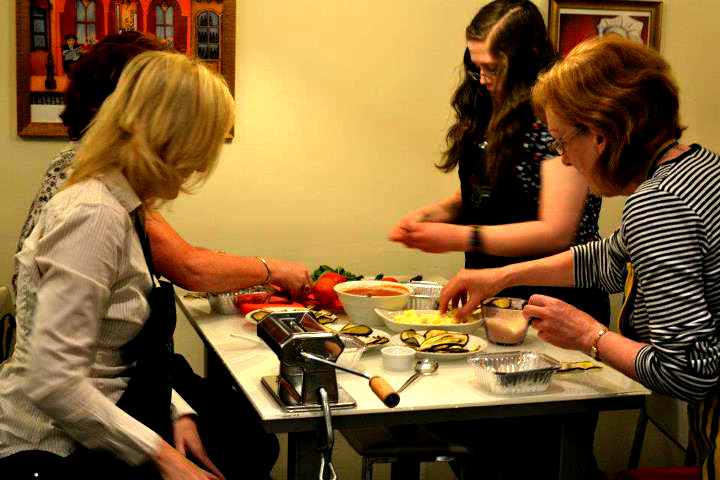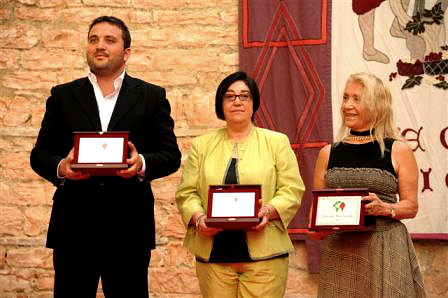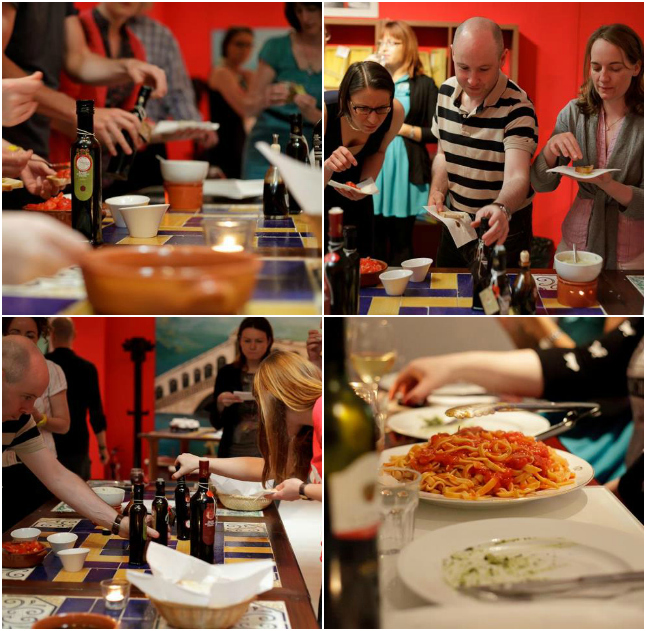
Article written by Briana Palma for 
It’s a Saturday afternoon at Dublin’s Italian School of Cooking and a group of about 30 people, almost all of whom are Irish, are busy kneading, rolling and cutting dough for homemade tagliatelle pasta. The room is filled with chatter and laughter, interrupted every so often by a suggestion or quick demonstration from teachers Giuseppe Crupi and Isabella Cavarretta. The Italian duo also encourage their students with a “perfetto!” here and a “bravo!” there.
By the time the afternoon-long cookery course finishes, the group have prepared (and eaten) involtini di melanzane alla parmigiana (aubergine rolls filled with mozzarella), the tagliatelle with amatriciana sauce and tiramisù.
Led by Crupi and Cavarretta, the cookery school offers lessons most Saturdays, as students show up to its building in the outskirts of Dublin to prepare meals organised around themes, such as the different regions of Italy, seasons and even specific ingredients like tomato.

Italian entrepreneurs Marco Giannantonio and Maurizio Mastrangelo established the school seven years ago. Today it is just one of the businesses under the Flavour of Italy Group, which also includes a catering company, travel agency and restaurant, Pinocchio.
In July, the group’s vision and hard work were rewarded, as the Italian School of Cooking won the 2012 Globo Tricolore award for cuisine. Established in 2009, the annual awards honour people in a variety of fields, ranging from art and music to journalism and research. Though their professions differ, the winners all have one thing in common: they promote the excellence of ‘Made in Italy’ around the world.

For Giannantonio and Mastrangelo, that simple desire to celebrate Italian culture became the very basis of their business. “Food, I find, is an easy access key to the culture of a country,” Crupi explains. He adds that the cookery school came first, because Giannantonio and Mastrangelo wanted to share with Irish people that famous Italian passion for cooking and “awaken the little Italian inside them”.
Over the years, the Italian School of Cooking has become a popular spot to spend a Saturday afternoon. It also attracts hen parties, team building groups and other private events, including a recent visit by Dublin’s Lord Mayor Andrew Montague. “There is a sort of Mediterranean culture in Ireland in the sense that the Irish like the big family, they like to share,” Crupi explains. “We are all very friendly and there is a mutual love among us, because Italian people really love Irish people. So I think when they go to Italy, they feel like they’re at home, and it’s the same for Italian people coming here and living here.”
While Ireland isn’t known for its cuisine the way Italy is, Cavarretta and Crupi praise Irish people for their appreciation of quality food and willingness to try new things. “People start to make their own arancine and then sometimes they send a picture and they say, ‘This is mine. It’s much nicer than the one I had in Sicily.’” Crupi comments. “You really feel they are approaching your culture and you feel like you’re an
ambassador of the good part of it.”

In March, that cultural ambassador role evolved even further with the establishment of the not-for-profit Federation of Italian Businesses in Ireland (F.I.B.I.), which Flavour of Italy co-founded with Benevento-based Strive Marketing & Communication. With support from the Italian Embassy and Italian Institute of Culture, F.I.B.I. aims to strengthen the relationship between the two countries by promoting all things Italian within Ireland and vice-versa.
Cavarretta and Crupi believe that F.I.B.I. is a natural progression of their work, because at the heart of Flavour of Italy is a love for Italian food and culture rather than profits. “Commercially, some of our choices were not the best because we didn’t go for the cheap product just to make money or for the easy demonstration classes,” Crupi remarks. “The whole spirit was always about promoting the Italian culture, otherwise none of us would have done this job. We would have gone for a job in a bank.”

“One day we were talking about how we dedicate so much of our free time to [our jobs] that we probably get €1 per hour,” he adds, laughing. “It’s funny because for instance, if we go to a dinner party back home in Italy, any time they give us some food or a new recipe, the first thing we say is, ‘How can we bring this to a class?’ As Isabella says, it’s a mission for us.”
– See more at: http://www.italymagazine.com/featured-story/bridge-italy-dublin-ireland

